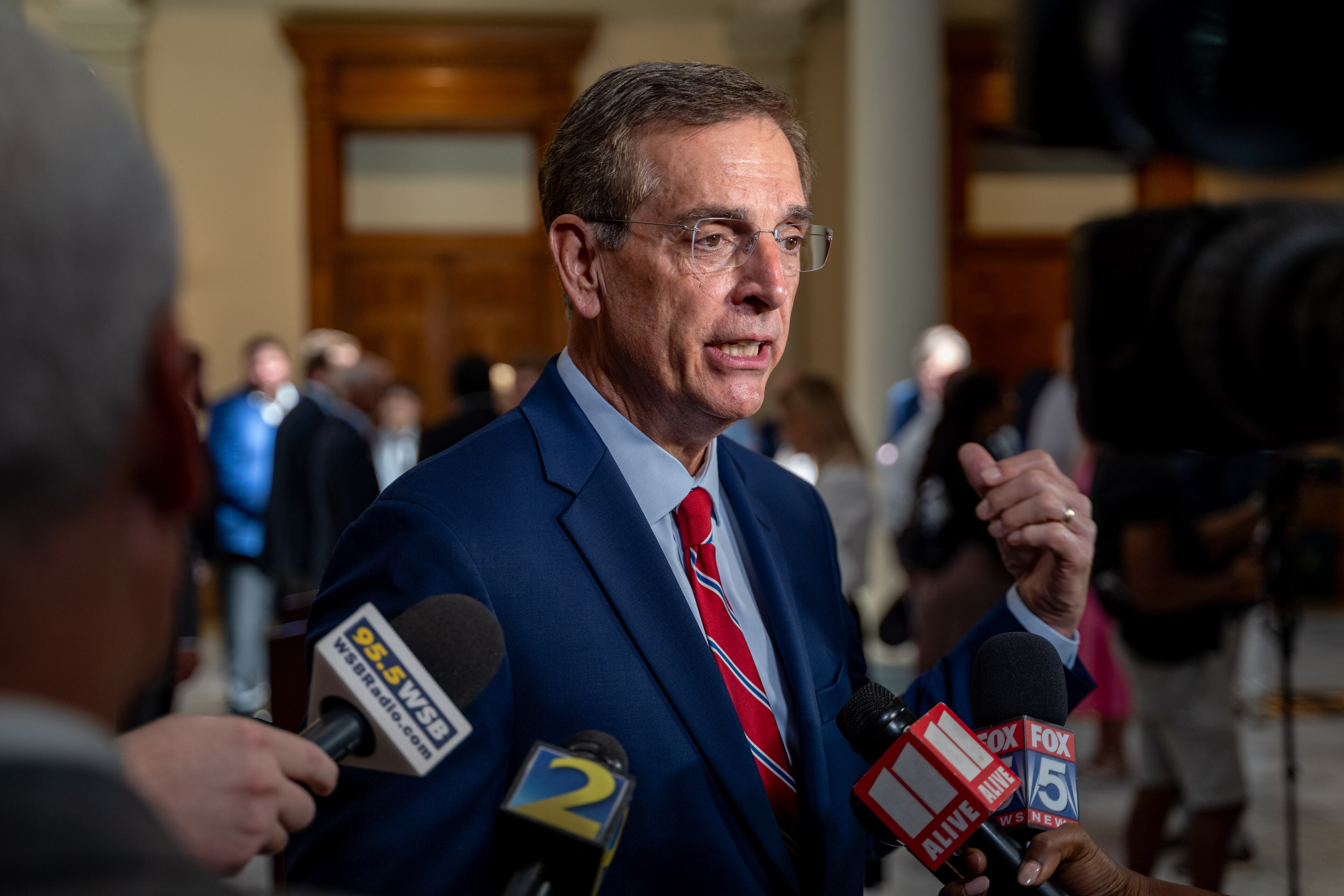Georgia’s mass voter registration cancellation puts some at risk

Marcus Jacobs-King is a registered Georgia voter — for now. But he’s about to lose his ability to vote because he hasn’t cast a ballot in more than a decade.
Jacobs-King is one of 478,000 people whose Georgia voter registrations are scheduled for cancellation this week because they haven’t participated in recent elections or moved away.
“I’m concerned about it. Like most people, I want my voting rights and want to make a difference,” said Jacobs-King, a 35-year-old from Fairburn who works in the cargo industry. “In most cases, I was busy and had to do something and couldn’t get to vote soon enough.”
Georgia’s mass cancellation of inactive voter registrations this year — one of the largest in U.S. history — targets people who likely moved away and didn’t vote in the last two general elections. But the cancellation effort comes with a risk that eligible voters could get swept up in the process.
Those cancellations include voters like Jacobs-King, who could lose their registrations because they haven’t voted in recent years.
Eligible voters on this year’s cancellation list face a Wednesday deadline to keep their registrations from being canceled.
An Atlanta Journal-Constitution analysis of voter data found that, in recent years, about one in five Georgians removed from the rolls rejoined.
About 210,000 voters canceled in previous biennial removals from 2017 to 2023 reregistered to vote in Georgia, and over half of them still live in the same county, according to the AJC analysis.
Voters who reregistered include people who left Georgia and then moved back, signed up to vote again when renewing their driver’s licenses, or registered again in advance of major elections.
“Things are constantly in a state of churn,” said Trey Hood, a political scientist at the University of Georgia. “There’s constantly people that are getting added to the rolls. There’s constantly people that are getting subtracted from the rolls.”

Secretary of State Brad Raffensperger said the cancellations, which amount to 6% of Georgia’s 8.4 million registered voters, will ensure Georgia’s voter rolls “are the cleanest in the nation.”
“Clean voter rolls mean clean elections. My promise to Georgia voters is elections that are free, fair and fast — and we’re doing just that,” Raffensperger said.
The voting rights group Fair Fight called the cancellations “voter suppression by administrative process” that disproportionately affects Black voters.
Overall, Black voters’ registrations account for 32% of cancellations, slightly more than their 31% of all registrants in Georgia. But Black voter registrations make up a higher rate, 41%, of those being canceled because they haven’t participated in elections in several years, the AJC found.
“Once again, politicians are rushing to remove voters based on unreliable data — and young Black voters are bearing the brunt,” said Fair Fight CEO Lauren Groh-Wargo.
However, just because Black voters make up a higher share of voters flagged for cancellation doesn’t necessarily mean there’s discrimination, said Andra Gillespie, a political scientist at Emory University.
“Nonvoting rates do tend to be higher in communities of color, so it’s not surprising that you might see higher levels of nonvoting that make you subject to purging,” Gillespie said.
The cancellations cover inactive voters who changed their addresses, registered to vote or obtained a driver’s license in another state, had undeliverable election mail, or haven’t participated in elections for roughly 10 years.
Georgia has a “use it or lose it” law that cancels dormant registrations based on the assumption those voters have moved.
Nearly 106,000 voters are scheduled for cancellation because of the “use it or lose it” law, amounting to 22% of the total planned registration removals.
Under Georgia law, voters become “inactive” when they appear to have moved. Then they can be canceled if they miss the next two general elections.
The secretary of state’s office has said it’s highly confident that cancellations affect voters who are ineligible to vote, but election officials are still advising voters to check their registrations to ensure they’re not at risk.
A problem with large-scale cancellations — especially removals of voters because they haven’t participated in several years — is that they can incorrectly remove voters who haven’t moved from Georgia, Julie Houk, an attorney for the Lawyers’ Committee for Civil Rights Under Law, a Washington-based civil rights organization.
“There’s usually some cancellations that are wrong,” Houk said. “Just because you elect not to vote should not be a reason to remove you from the rolls. It should be based on the idea that you moved, not that you decided to sit an election out.”
More about Georgia’s voter registration cancellations
Georgia begins one of the largest voter registration cancellations in history
Search your name: Will my Georgia voter registration be canceled? Find out here
A history of recent mass Georgia voter registration cancellations
Meanwhile, conservative groups have criticized Raffensperger’s office for not going far enough, suggesting that many more registrations should be removed.
Inactive voter registrations can only be canceled after notifications are mailed to voters and they miss at least two general elections, according to federal law.
“This voter roll cleanup is not only common sense, it’s long overdue,” said Terry Fye of Greater Georgia, a conservative voter mobilization organization. “Election officials, and especially the secretary of state’s office, are legally required to keep our rolls accurate, and failing to do so undermines trust in our elections and opens the door to potential fraud.”
The large number of cancellations reflects Georgia’s highly mobile population, with many people frequently moving in and out.
Voters aged 30-44 are roughly twice as likely as any other age group to appear on the cancellation list, making up 44% of voters scheduled for removal.
Georgia voters can check their registration status through the AJC’s voter cancellation search tool and find their registration information on the state’s My Voter Page at mvp.sos.ga.gov.
Voters can restore their registrations to “active” status and prevent cancellations by filling out information on the My Voter Page, responding to notification letters mailed last month or contacting their county election office.




